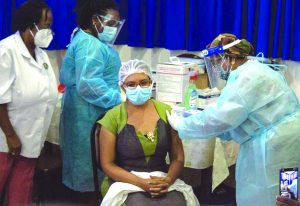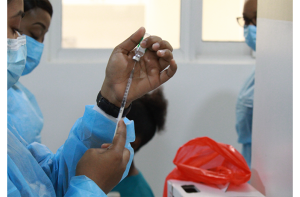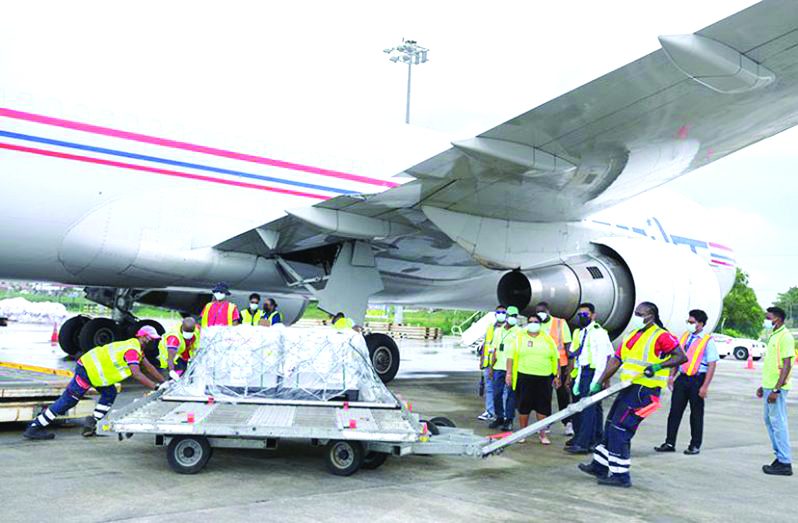–billions ‘injected’ into COVID-19 fight
–works underway to improve, modernise health sector
OVER the past year, billions of dollars were approved by the National Assembly to fund the procurement and rollout of thousands of COVID-19 vaccines and supplies, so that each adult residing in Guyana would be protected against COVID-19.
Initially, $2.1 billion was expended on critical items such as medical supplies, COVID-19 testing kits, sanitising materials and Personal Protective Equipment (PPE). In February, over $750 million was approved in the 2021 National Budget to support the rolling out of COVID-19 vaccines. And, in June, $619 million was approved by the Committee of Supply of the National Assembly for the procurement of several thousand more vaccines.
Comparatively, the money spent to control the spread and devastation of the novel coronavirus- aside from expenditures in the general health sector- has been quite substantial. But the expenditure is not wasteful, President Dr. Irfaan Ali reasoned on numerous occasions.

“There is no price when it comes to the life of the people of this country,” the President said emphatically on the side-lines of a recent event at his official residence, State House.
The COVID-19 pandemic has not only tested the strength of the local health system but, unfortunately, claimed the lives of more than 500 people. With no cure, health authorities agree that prevention is the surest way of staying safe. And, it is for this reason great efforts have been made to procure the necessary protective gear and vaccines.
These efforts have not been unchallenged, though. The procurement of batches of the Russian-made Sputnik V vaccines, for example, came under scrutiny. But the President explained that vaccine shortage has been a global issue.
In fact, the World Health Organization (WHO) has criticised what it describes as a “shocking imbalance” in the distribution of coronavirus vaccines between rich and poor countries.
“There remains a shocking imbalance in the global distribution of vaccines,” WHO Director- General Dr. Tedros Adhanom Ghebreyesus told a news conference in April.
He lamented that, on average, almost one in four people in high income countries have received a COVID-19 vaccine while in low-income countries, that number is one in more than 500.
Cognisant of this challenge, the President related that the local authorities were willing to pursue any avenue that would guarantee a large supply of the life-saving vaccines, even if it meant spending larger sums of money.
To date, more than half of the targetted adult population in Guyana has received at least their first dose of a COVID-19 vaccine, while more than a quarter of the population has received both vaccine doses. Vaccination efforts have continued despite the recent nationwide flooding and many of the geographical challenges that exist.
Still, the emergence and surge of variants of concern of SARS-CoV-2, the virus that causes the disease COVID-19, present a new threat. According to the BBC, it is not unusual for viruses to mutate, and more often than not, mutations are usually insignificant. Sometimes, however, viruses do mutate into ‘stronger’ or more advantageous forms of the virus.

This has been the case with four variants thus far: the Alpha variant that emerged in the United Kingdom (UK) last year; the Beta variant that emerged in South Africa; the Gamma variant that emerged in Brazil and the Delta variant that emerged in India. These variants are still categorised as coronavirus that causes the disease COVID-19, except they have mutated into stronger or more infectious forms.
Even without adequate genomic sequencing, a scientific test for the presence of variants, the Health Minister Dr. Frank Anthony said that the local health authorities are assuming that variants are circulating in Guyana and as such, that the population is exposed to more infectious forms of the disease-causing virus.
“Right now, while the Delta variant was first discovered in India, it is it is now the dominant variant in the United States (U.S.) and we have travel back and forth from the U.S. on a daily basis, so one can assume that we have different types of variants that are circulating in Guyana and would have contributed to the clinical picture that we see,” the health minister said recently.
And, the “clinical picture” recorded locally, he related, has been those increasing numbers. He, however, hastened to add that despite the unconfirmed presence of variants, the preventative and protective measures for COVID-19 have not changed; masks still need to be worn, crowds need to be avoided and adequate sanitisation is a necessity.
Importantly, he said that vaccination remains a crucial weapon in the available artillery to protect against COVID-19. These vaccines, he explained, would not prevent an individual from becoming infected but would prevent an individual from developing the more serious or life-threatening symptoms, thereby preventing hospitalisation and deaths.
HEALTH SECTOR MODERNISATION
Meanwhile, outside of the realm of the pandemic, efforts are underway to improve people’s access to health services and modernise the health sector. Aggregately, $53.5 billion was allocated to the health sector in the 2021 National Budget.
Senior Minister in the Office of the President with responsibility for Finance, Dr. Ashni Singh, said this allocation was made with the aim of expanding speciality care, developing an adequately trained and competent healthcare workforce, and modernising and expanding local health facilities.
Catered for in this sum is $1.8 billion to purchase critical medical equipment for the public health sector; $99.8 million is budgeted for re-equipping the ophthalmology hospital at Port Mourant; and $322 million for the acquisition of medical equipment, including ventilators and anesthesia machines, which will expand diagnosis and treatment capacity at the national referral hospital, which is the Georgetown Public Hospital Corporation (GPHC).
Additionally, $35 million is budgeted under this allocation for the health sector to strengthen the Emergency Medical Services (EMS) capacity.
In recent months, in addition to constructing and expanding vaccination sites, efforts have been made to rehabilitate and develop other health facilities.
The Festival City health centre, for example, is expected to accommodate a dental section, a physiotherapy department and a laboratory. Also, it is expected that eight medical doctors can be accommodated on-site to provide diagnostic services to patients. There are also the ‘SMART’ upgrades to hospitals across the country.
Improving health services across the health sector is paramount since, as Head of Internal Medicine at the Georgetown Public Hospital Corporation (GPHC), Dr Mahendra Carpen, said, chronic Non-Communicable Diseases (NCDs) are still the number one cause of diseases and disability.
In 2020, the Pan-American Health Organisation’s (PAHO)’s NCDs progress monitor for Guyana stated that 4,400 deaths (or 68 per cent of all deaths) were caused by NCDs. This report was published in March 2020, which meant that this information was applicable to the year before. This, therefore, meant that the total number of deaths would have been approximately 6,471.
It is also important to note that persons with underlying diseases- other cardiovascular diseases, respiratory illnesses, diabetes or other NCDs- are increasingly vulnerable to the more severe effects of COVID-19. These underlying conditions are termed comorbidities.




.png)









